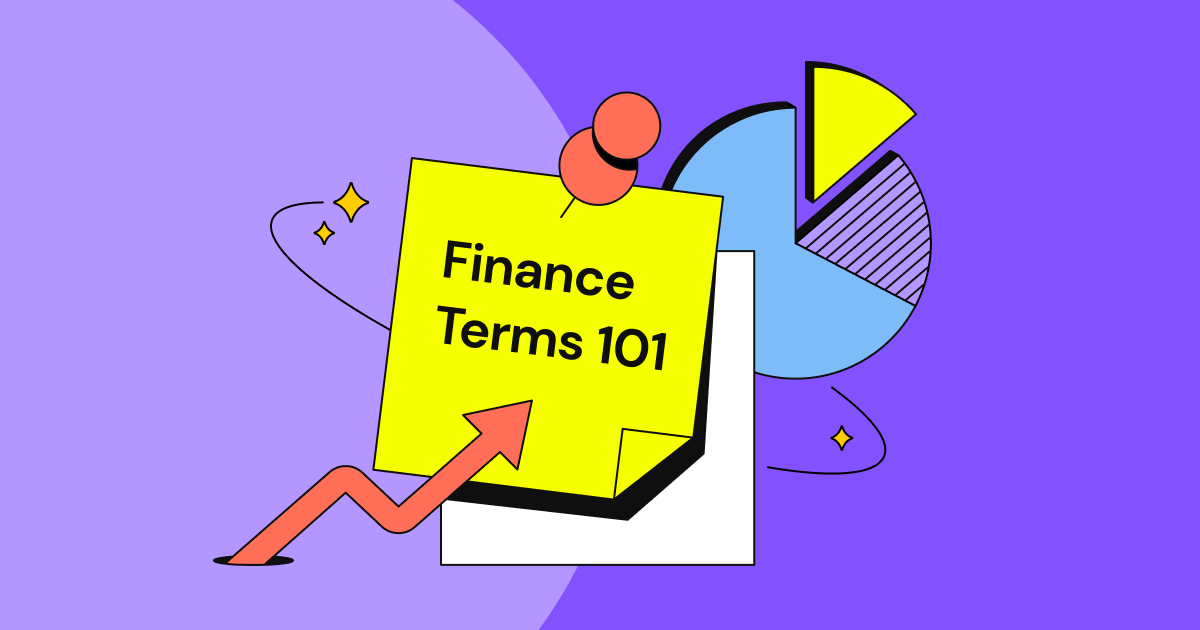Finance can be a complex and intimidating field for many people, with its own language and jargon that can make it difficult to understand. However, having a basic understanding of key finance terms is essential for everyone.
Whether you want to better manage your personal finances, make wise investment decisions, or avoid financial pitfalls, it’s crucial that you learn some key financial terminology. To make things easier for you, we’ll cover some of the most important ones.
So, let’s dive in and demystify some of the most common finance concepts!
15 Important Finance Terms to Be Aware Of
Here’s a list of finance terms and definitions that will help you confidently navigate the complex world of finance.
1. Loan
A loan is a financial arrangement between a borrower and a lender. The borrower receives a sum of money from the lender and agrees to repay the borrowed amount plus interest over a set period.
You can use them to finance specific purchases or expenses, such as a home, car, or education. They come in various forms, such as secured or unsecured. They may also have different terms and conditions depending on the lender and the borrower’s creditworthiness.
2. Interest
Interest is a fee charged by a lender to a borrower for the use of borrowed money, usually expressed as a percentage of the loan amount. In other words, it is the cost of borrowing money. When a borrower takes out a loan, they agree to pay back the borrowed amount plus interest over a set period.
If the interest rate on a loan is fixed, it means it stays the same throughout the loan term. If it’s variable, it means it can change based on market conditions or other factors. Sometimes, it’s compounded. This is when the interest is charged not only on the original loan amount but also on any accumulated interest.
3. Credit
Credit refers to one’s ability to borrow money with the promise of paying it back later, often with interest. It’s a form of debt that allows individuals or businesses to access funds they don’t currently have.
Financial institutions such as banks, credit unions, or credit card companies can issue a credit after assessing the borrower’s creditworthiness. The lender evaluates the borrower’s credit history, income, and other financial factors to determine their ability to repay the loan.
4. Taxes
Taxes are mandatory fees that individuals and businesses must pay to the government. Governments use them to fund public services and infrastructure, such as schools, roads, and healthcare. They can take many forms, including income, sales, property, and excise taxes.
The amount of tax an individual or business should pay depends on their income, property value, or the purchase price of goods and services.
5. FICO Score
FICO score is a credit scoring system many lenders and financial institutions use to assess an individual’s creditworthiness. The FICO score is based on a scale of 300 to 850, with a higher score indicating better creditworthiness.
The score is calculated using several factors, including an individual’s payment history, amounts owed, length of credit history, types of credit used, and new credit inquiries. To improve your FICO score, you should make timely payments, pay down debt, and avoid new credit inquiries.
6. Asset
An asset refers to any resource or property that has value and can be owned or controlled by an individual, business, or other entity. Assets can take many forms, including cash, investments, real estate, equipment, intellectual property, and inventory.
They are essential in finance because they represent potential sources of future value.
7. Liability
Liability refers to any debt or obligation that an individual, business, or other entity owes to another party. They can be in the form of loans, mortgages, credit card balances, accounts payable, and other financial obligations.
Liabilities represent claims on an individual’s or business’s assets and must be repaid at some point in the future. Failure to meet these obligations can result in penalties, legal action, and damage to credit ratings.
8. Net Worth
Net worth is a financial term representing the difference between an individual’s assets and liabilities. In other words, net worth is the amount by which an individual’s assets exceed their debts and other financial obligations.
To calculate net worth, an individual would add up the value of all their assets and subtract from that the total of their liabilities. Assets include cash, investments, real estate, and other property. On the other hand, liabilities include mortgages, loans, credit card balances, and other debts.
9. Net Income
Net income, also known as net earnings or net profit, is a financial term that represents the total income an individual, business, or other entity earns minus any expenses or costs associated with generating that income. In other words, net income is the amount of money that remains after all expenses have been paid.
A positive net income indicates that the entity has earned more than it spent on expenses. A negative net income indicates that the entity has spent more on expenses than it has earned in income.
10. Stock
The term “stock” refers to a type of security that represents ownership in a company. When an individual buys a share of stock, they essentially buy a piece of ownership in that company. This ownership entitles the shareholder to a portion of the company’s assets and earnings, as well as the right to vote on important corporate decisions.
Buyers and sellers come together on stock exchanges to exchange shares. The price of a stock can fluctuate depending on various factors, including the company’s financial performance, industry trends, and overall market conditions.
11. Mortgage
A mortgage is a type of loan one uses to purchase or refinance real estate, such as a home or a commercial property. If the borrower is unable to repay the loan, the lender can foreclose on the property and sell it to recoup their losses.
When an individual or business takes out a mortgage, they typically make a down payment and then repay the loan over a period of years, usually with interest. The mortgage terms, such as the interest rate, length of the loan, and repayment schedule, are typically negotiated between the borrower and the lender when the loan is issued.
12. Income
Income refers to the money that an individual or organization earns from their work, investments, or other sources. It includes wages and salaries, rental income, investment income, and business profits.
13. Expenses
Expenses refer to the costs incurred by an individual or organization while operating their business or managing their personal finances. They can include various items, such as rent, utilities, wages and salaries, supplies, taxes, and insurance. They may also include other costs associated with running a business or managing personal finances.
14. Budget
A budget refers to a plan that outlines an individual’s or organization’s projected income and expenses over a specific period, typically on a monthly or annual basis. It helps them manage their finances, set financial goals, and make smart decisions about spending and saving.
A budget usually includes all sources of income and all expenses, including fixed expenses (such as rent or mortgage payments) and variable expenses (such as groceries or entertainment). It may also include projected savings goals or debt repayment plans.
15. Savings
Savings refers to the portion of one’s income that is set aside for future use instead of spending it immediately. Individuals may save money for various reasons, such as building an emergency fund, saving for a down payment on a home or a car, or planning for retirement.
Organizations may also save money for similar reasons. For example, building up a reserve fund to cover unexpected expenses or investing in long-term growth opportunities.
Conclusion
Understanding basic finance terms like the ones we covered in this text will help you better manage your finances, make sound financial decisions, and work towards your financial goals. Speaking of financial goals, you can always earn some extra money with Pawns.app.
The app lets you share your unused bandwidth with others and take online surveys in exchange for cash. It’s an easy way to earn some passive income while commuting, waiting in line, or even sleeping!


